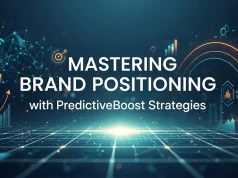Digital marketing is no longer a nice-to-have—it’s essential. As more people spend their time online, businesses must use digital tools to stay visible. But beyond just driving traffic, one major goal of digital marketing is to build brand awareness.
So, how does digital marketing enhance brand awareness?
Let’s break it down simply. Digital marketing helps your brand reach the right audience at the right time. Whether through search engines, social media, or email, it creates multiple points of contact that reinforce your brand in the mind of your audience.
Understanding Brand Awareness in the Digital World
Brand awareness means your target customers know who you are, recognize your logo, and understand what you offer. It’s the first step in the customer journey. Without awareness, your audience can’t trust you, and without trust, they won’t buy from you.
Traditional marketing once played this role—TV, billboards, radio. But now, digital marketing offers better reach, lower costs, and deeper data. It doesn’t just introduce people to your brand; it gives them reasons to remember and return.
To fully understand the mechanics behind brand success, it’s helpful to explore how brands grow—especially what marketers often overlook.
How Digital Marketing Builds Brand Recognition
Every digital touchpoint—whether it’s an Instagram reel, a Google ad, or a blog post—acts like a brand impression. The more consistent and strategic these interactions are, the stronger your brand becomes in the public eye.
Let’s walk through how different digital channels work together to build that awareness:
SEO: The Long-Term Brand Builder
Search engine optimization (SEO) is one of the most sustainable ways to grow your brand. By optimizing your content for specific keywords, your business can appear in search results when people look for topics related to your industry.
When your website ranks on Google, users begin to associate your brand with helpful information. Even if they don’t click the first time, they see your name again and again. Over time, you earn trust through visibility.
Think about this: If you appear every time someone Googles a question about your niche, how could they not remember your brand?
Social Media: Creating Personality and Connection
People don’t just follow brands for updates—they follow for personality. Social platforms like Instagram, TikTok, LinkedIn, and Facebook allow businesses to share their voice, values, and culture.
You’re not limited to selling. You can tell stories, share behind-the-scenes looks, and connect through comments and messages. These interactions create emotional bonds that traditional ads can’t.
The more consistent your message and visual identity are across these platforms, the more people begin to recognize and remember you.
Content Marketing: Educate to Earn Attention
If SEO is the engine, content is the fuel. Whether it’s a blog, podcast, video, or eBook, content marketing builds awareness by giving something valuable before asking for anything in return.
People search for solutions to problems. If your brand provides those answers, you gain attention and credibility. Over time, readers turn into followers, followers into fans.
This type of marketing isn’t about pushing your product. It’s about proving your brand is trustworthy, knowledgeable, and helpful.
Paid Advertising: Fast-Track Awareness
Organic methods take time, but paid advertising can give your brand a jumpstart. Platforms like Google Ads or Meta Ads allow you to put your brand in front of highly targeted audiences instantly.
You can target people based on location, interest, or behavior. Even if they don’t click, your brand name and message still appear. That impression counts.
Retargeting ads are especially powerful. They remind users who visited your website or profile, encouraging a second visit or action. It keeps your brand top of mind without being invasive.
Email Marketing: Nurturing Brand Recall
Email might sound old-school, but it’s one of the highest ROI digital channels. A well-designed email campaign can keep your brand in a customer’s inbox and mind.
By sharing useful tips, industry news, or exclusive offers, you make your brand feel personal and helpful. It’s not about spamming; it’s about staying relevant and respectful.
With time, consistent emailing helps cement your brand’s presence and tone.
Consistency: The Secret Ingredient
All these channels work better when your brand looks and sounds the same across the board. This doesn’t mean robotic repetition—it means unified branding.
Your colors, fonts, messaging, and tone of voice should feel consistent. If someone visits your site after seeing your Instagram ad, it should feel familiar. That consistency builds trust.
Inconsistent branding confuses users. Confusion leads to distrust. Consistency creates comfort, and comfort leads to conversion.
Why Brand Awareness Is Worth Your Time
Building brand awareness might not deliver immediate sales—but it builds something even more valuable: memory and trust. People don’t buy from companies they’ve never heard of. They buy from the names they recognize and feel comfortable with.
The more someone sees your brand in helpful, positive contexts, the more likely they are to engage. Digital marketing makes that repetition possible without the massive budgets traditional ads require.
And because it’s measurable, you know what’s working. You can track impressions, engagement, reach, and more—all in real time.
Final Thoughts
How does digital marketing enhance brand awareness? It does so through visibility, repetition, and connection. It introduces your brand, educates your audience, and reminds them again and again that you exist to help.
Unlike old-school methods, digital marketing gives you the tools to shape how people perceive your brand—and to do it with precision.
The key is consistency, relevance, and long-term thinking. If you use digital platforms not just to sell, but to tell your story and offer value, your brand will stay top of mind long after the ad or post is gone.




